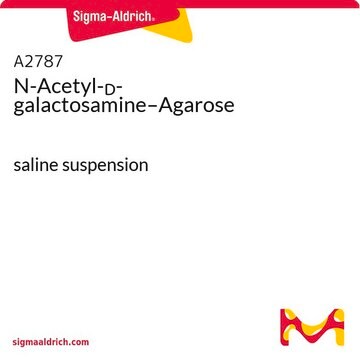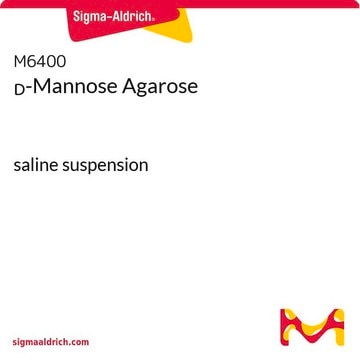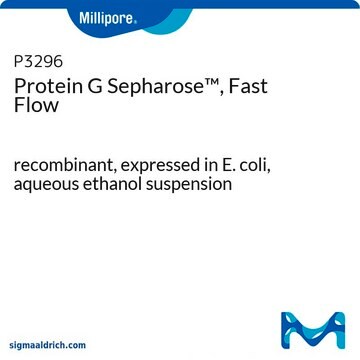L7634
α-Lactose-Agarose
saline suspension
Synonym(s):
alpha-lactose resin
Sign Into View Organizational & Contract Pricing
All Photos(1)
About This Item
Recommended Products
biological source
bovine milk
form
saline suspension
technique(s)
affinity chromatography: suitable
matrix
6% beaded agarose
matrix activation
divinyl sulfone
matrix attachment
hydroxyl
matrix spacer
5 atoms
capacity
6-25 mg/mL binding capacity (lectin from Arachis hypogaea)
suitability
suitable for chromatography
storage temp.
2-8°C
Application
α-Lactose-agarose has been used:
- in protein chromatography to purify galectins from lysed bacteria cells
- to capture ricin based on lectin-carbohydrate affinity
- to study microneme proteins and host-parasite cell surface receptors
α-lLactose-agarose is used in protein chromatography, affinity chromatography and carbohydrate matrices. α--Lactose-agarose has been used to study microneme proteins and host-parasite cell surface receptors.
Physical form
Suspension in 0.15 M NaCl, 0.01 M sodium phosphate, pH 6.8, containing 0.02% sodium azide
Storage Class Code
10 - Combustible liquids
WGK
WGK 3
Flash Point(F)
Not applicable
Flash Point(C)
Not applicable
Certificates of Analysis (COA)
Search for Certificates of Analysis (COA) by entering the products Lot/Batch Number. Lot and Batch Numbers can be found on a product’s label following the words ‘Lot’ or ‘Batch’.
Already Own This Product?
Find documentation for the products that you have recently purchased in the Document Library.
Customers Also Viewed
C V Hughes et al.
Infection and immunity, 60(3), 1178-1186 (1992-03-01)
The gram-negative human oral bacterium Veillonella atypica PK1910 exhibits both lactose-inhibitable and lactose-noninhibitable coaggregations with certain human oral streptococci. A mild sonication procedure was used to obtain a veillonella surface protein preparation against which antisera were prepared. To characterize the
B Beaumelle et al.
The Journal of biological chemistry, 268(31), 23661-23669 (1993-11-05)
Ricin translocation was demonstrated (using both fluorescence- and radiolabel-based assays) across the membrane of endosomes purified from mouse lymphocytes. Selectivity of the process was shown by the absence of translocation activity of transferrin and horseradish peroxidase used as membrane-bound and
C Allison Gray et al.
Proceedings of the National Academy of Sciences of the United States of America, 101(21), 7982-7987 (2004-05-19)
Secretions of the uterus support survival and growth of the conceptus (embryo/fetus and associated membranes) during pregnancy. Galectin-15, also known as OVGAL11 and a previously uncharacterized member of the galectin family of secreted beta-galactoside lectins containing a conserved carbohydrate recognition
Christophe Dussouy et al.
Chemical biology & drug design, 96(4), 1123-1133 (2020-03-29)
Galectins play key roles in numerous biological processes. Their mode of action depends on their localization which can be extracellular, cytoplasmic, or nuclear and is partly mediated through interactions with β-galactose containing glycans. Galectins have emerged as novel therapeutic targets
E V Lourenço et al.
Glycobiology, 11(7), 541-547 (2001-07-12)
Host cell invasion by Toxoplasma gondii is a multistep process with one of the first steps being the apical release of micronemal proteins that interact with host receptors. We demonstrate here that micronemal protein 1 (MIC1) is a lactose-binding lectin.
Our team of scientists has experience in all areas of research including Life Science, Material Science, Chemical Synthesis, Chromatography, Analytical and many others.
Contact Technical Service













